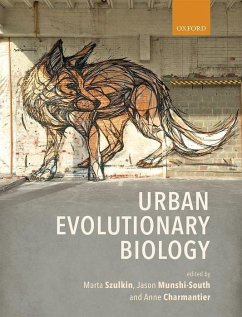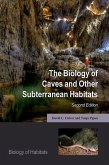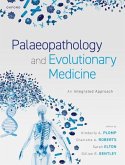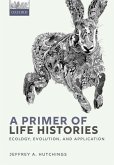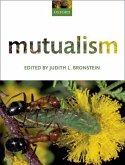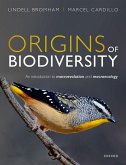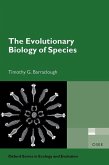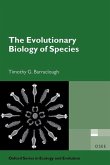Urban Evolutionary Biology
Herausgeber: Charmantier, Anne; Szulkin, Marta; Munshi-South, Jason
Urban Evolutionary Biology
Herausgeber: Charmantier, Anne; Szulkin, Marta; Munshi-South, Jason
- Broschiertes Buch
- Merkliste
- Auf die Merkliste
- Bewerten Bewerten
- Teilen
- Produkt teilen
- Produkterinnerung
- Produkterinnerung
Urban Evolutionary Biology fills an important knowledge gap on wild organismal evolution in the urban environment, whilst offering a novel exploration of the fast-growing new field of evolutionary research.
Andere Kunden interessierten sich auch für
![The Biology of Caves and Other Subterranean Habitats The Biology of Caves and Other Subterranean Habitats]() David C. Culver (Profe Professor Emeritus of Environmental ScienceThe Biology of Caves and Other Subterranean Habitats58,99 €
David C. Culver (Profe Professor Emeritus of Environmental ScienceThe Biology of Caves and Other Subterranean Habitats58,99 €![Palaeopathology and Evolutionary Medicine Palaeopathology and Evolutionary Medicine]() Palaeopathology and Evolutionary Medicine54,99 €
Palaeopathology and Evolutionary Medicine54,99 €![A Primer of Life Histories A Primer of Life Histories]() Jeffrey A. Hutchings (Professor of Biology, Professor of Biology, DA Primer of Life Histories44,99 €
Jeffrey A. Hutchings (Professor of Biology, Professor of Biology, DA Primer of Life Histories44,99 €![Mutualism Mutualism]() Mutualism73,99 €
Mutualism73,99 €![Origins of Biodiversity Origins of Biodiversity]() Lindell Bromham (Professor in Ev Professor in Evolutionary BiologyOrigins of Biodiversity46,99 €
Lindell Bromham (Professor in Ev Professor in Evolutionary BiologyOrigins of Biodiversity46,99 €![The Evolutionary Biology of Species The Evolutionary Biology of Species]() Timothy G. Barraclough (Professo Professor of Evolutionary BiologyThe Evolutionary Biology of Species134,99 €
Timothy G. Barraclough (Professo Professor of Evolutionary BiologyThe Evolutionary Biology of Species134,99 €![The Evolutionary Biology of Species The Evolutionary Biology of Species]() Timothy G. Barraclough (Professo Professor of Evolutionary BiologyThe Evolutionary Biology of Species43,99 €
Timothy G. Barraclough (Professo Professor of Evolutionary BiologyThe Evolutionary Biology of Species43,99 €-
-
-
Urban Evolutionary Biology fills an important knowledge gap on wild organismal evolution in the urban environment, whilst offering a novel exploration of the fast-growing new field of evolutionary research.
Produktdetails
- Produktdetails
- Verlag: Oxford University Press
- Seitenzahl: 320
- Erscheinungstermin: 5. Mai 2020
- Englisch
- Abmessung: 247mm x 192mm x 19mm
- Gewicht: 668g
- ISBN-13: 9780198836858
- ISBN-10: 0198836856
- Artikelnr.: 57978223
- Verlag: Oxford University Press
- Seitenzahl: 320
- Erscheinungstermin: 5. Mai 2020
- Englisch
- Abmessung: 247mm x 192mm x 19mm
- Gewicht: 668g
- ISBN-13: 9780198836858
- ISBN-10: 0198836856
- Artikelnr.: 57978223
Marta Szulkin is an evolutionary biologist who completed her first degree at the University of Warsaw, Poland. She holds a Masters and a Doctoral degree in evolutionary biology from the University of Oxford (UK). Marta was as Magdalen College Research Fellow (University of Oxford), and a Marie Curie Fellow at CEFE CNRS in Montpellier (France). She is currently associate professor at the Centre of New Technologies, University of Warsaw (Poland), where she is heading the Wild Urban Evolution & Ecology Lab. She is managing a prospectively long-term study of urban passerines in Warsaw, and is interested in the evolution and ecology of all urban life. Jason Munshi-South is an evolutionary ecologist that completed a Ph.D. at the University of Maryland, USA, and a postdoctoral position at the Smithsonian Institution. He is currently a Professor of Biological Sciences at Fordham University in Bronx, NY, USA. His main research interests are the ecology and evolution of urban wildlife, with special emphasis on the landscape genomics of urban rodents. Anne Charmantier is an evolutionary ecologist educated in France, the UK and Canada, and presently holding a senior permanent CNRS position. Her main research interests are focused on understanding the mechanisms involved in the evolution of adaptive traits, especially in a context of rapid anthropogenic changes. Since 2007, she is managing a long-term blue tit project, which contributes to her research on local adaptation, plasticity, senescence, ecological genomics and sexual selection. She has particularly pioneered quantitative genetic approaches in wild populations, to study adaptive and non-adaptive responses to climate change and urbanisation.
* Foreword
* 1: Marta Szulkin, Jason Munshi-South and Anne Charmantier:
Introduction
* 2: Marta Szulkin, Colin J. Garroway, Michela Corsini, Andrzej Z.
Kotarba and Davide Dominoni: How to quantify urbanisation when
testing for urban evolution
* 3: James S. Santangelo, Lindsay S. Miles, Sophie T. Breitbart, David
Murray-Stoker, L. Ruth Rivkin, Marc T. J. Johnson and Rob W. Ness:
Urban environments as a framework to study parallel evolution
* 4: Jason Munshi-South and Jonathan L. Richardson: Landscape genetic
approaches to understanding movement and gene flow in cities
* 5: Charles Perrier, Aude Caizergues and Anne Charmantier: Adaptation
genomics in urban environments
* 6: Sarah E. Diamond and Ryan A. Martin: Evolutionary consequences of
the urban heat island
* 7: Rebecca E. Irwin, Elsa Youngsteadt, Paige S. Warren and Judith L.
Bronstein: The evolutionary ecology of mutualisms in urban landscapes
* 8: P.O. Cheptou and S. Lambrecht: Sidewalk plants as a model for
studying adaptation to urban environments
* 9: Amanda J. Gorton, Liana T. Burghardt and Peter Tiffin: Adaptive
evolution of plant life history in urban environments
* 10: R. Brian Langerhans and Elizabeth M.A. Kern: Urbanization and
evolution in aquatic environments
* 11: Kristien I. Brans, Lynn Govaert and Luc De Meester: Evolutionary
dynamics of metacommunities in urbanized landscapes
* 12: Kristin M. Winchell, Andrew C. Battles, Talia Y. Moore:
Terrestrial locomotor evolution in urban environments
* 13: Caroline Isaksson and Frances Bonier: Urban evolutionary
physiology
* 14: Tuul Sepp, Kevin J. McGraw and Mathieu Giraudeau: Urban sexual
selection
* 15: Daniel Sol, Oriol Lapiedra, and Simon Ducatez: Cognition and
adaptation to urban environments
* 16: Emmanuel Milot and Stephen C. Stearns: Selection on humans in
cities
* 1: Marta Szulkin, Jason Munshi-South and Anne Charmantier:
Introduction
* 2: Marta Szulkin, Colin J. Garroway, Michela Corsini, Andrzej Z.
Kotarba and Davide Dominoni: How to quantify urbanisation when
testing for urban evolution
* 3: James S. Santangelo, Lindsay S. Miles, Sophie T. Breitbart, David
Murray-Stoker, L. Ruth Rivkin, Marc T. J. Johnson and Rob W. Ness:
Urban environments as a framework to study parallel evolution
* 4: Jason Munshi-South and Jonathan L. Richardson: Landscape genetic
approaches to understanding movement and gene flow in cities
* 5: Charles Perrier, Aude Caizergues and Anne Charmantier: Adaptation
genomics in urban environments
* 6: Sarah E. Diamond and Ryan A. Martin: Evolutionary consequences of
the urban heat island
* 7: Rebecca E. Irwin, Elsa Youngsteadt, Paige S. Warren and Judith L.
Bronstein: The evolutionary ecology of mutualisms in urban landscapes
* 8: P.O. Cheptou and S. Lambrecht: Sidewalk plants as a model for
studying adaptation to urban environments
* 9: Amanda J. Gorton, Liana T. Burghardt and Peter Tiffin: Adaptive
evolution of plant life history in urban environments
* 10: R. Brian Langerhans and Elizabeth M.A. Kern: Urbanization and
evolution in aquatic environments
* 11: Kristien I. Brans, Lynn Govaert and Luc De Meester: Evolutionary
dynamics of metacommunities in urbanized landscapes
* 12: Kristin M. Winchell, Andrew C. Battles, Talia Y. Moore:
Terrestrial locomotor evolution in urban environments
* 13: Caroline Isaksson and Frances Bonier: Urban evolutionary
physiology
* 14: Tuul Sepp, Kevin J. McGraw and Mathieu Giraudeau: Urban sexual
selection
* 15: Daniel Sol, Oriol Lapiedra, and Simon Ducatez: Cognition and
adaptation to urban environments
* 16: Emmanuel Milot and Stephen C. Stearns: Selection on humans in
cities
* Foreword
* 1: Marta Szulkin, Jason Munshi-South and Anne Charmantier:
Introduction
* 2: Marta Szulkin, Colin J. Garroway, Michela Corsini, Andrzej Z.
Kotarba and Davide Dominoni: How to quantify urbanisation when
testing for urban evolution
* 3: James S. Santangelo, Lindsay S. Miles, Sophie T. Breitbart, David
Murray-Stoker, L. Ruth Rivkin, Marc T. J. Johnson and Rob W. Ness:
Urban environments as a framework to study parallel evolution
* 4: Jason Munshi-South and Jonathan L. Richardson: Landscape genetic
approaches to understanding movement and gene flow in cities
* 5: Charles Perrier, Aude Caizergues and Anne Charmantier: Adaptation
genomics in urban environments
* 6: Sarah E. Diamond and Ryan A. Martin: Evolutionary consequences of
the urban heat island
* 7: Rebecca E. Irwin, Elsa Youngsteadt, Paige S. Warren and Judith L.
Bronstein: The evolutionary ecology of mutualisms in urban landscapes
* 8: P.O. Cheptou and S. Lambrecht: Sidewalk plants as a model for
studying adaptation to urban environments
* 9: Amanda J. Gorton, Liana T. Burghardt and Peter Tiffin: Adaptive
evolution of plant life history in urban environments
* 10: R. Brian Langerhans and Elizabeth M.A. Kern: Urbanization and
evolution in aquatic environments
* 11: Kristien I. Brans, Lynn Govaert and Luc De Meester: Evolutionary
dynamics of metacommunities in urbanized landscapes
* 12: Kristin M. Winchell, Andrew C. Battles, Talia Y. Moore:
Terrestrial locomotor evolution in urban environments
* 13: Caroline Isaksson and Frances Bonier: Urban evolutionary
physiology
* 14: Tuul Sepp, Kevin J. McGraw and Mathieu Giraudeau: Urban sexual
selection
* 15: Daniel Sol, Oriol Lapiedra, and Simon Ducatez: Cognition and
adaptation to urban environments
* 16: Emmanuel Milot and Stephen C. Stearns: Selection on humans in
cities
* 1: Marta Szulkin, Jason Munshi-South and Anne Charmantier:
Introduction
* 2: Marta Szulkin, Colin J. Garroway, Michela Corsini, Andrzej Z.
Kotarba and Davide Dominoni: How to quantify urbanisation when
testing for urban evolution
* 3: James S. Santangelo, Lindsay S. Miles, Sophie T. Breitbart, David
Murray-Stoker, L. Ruth Rivkin, Marc T. J. Johnson and Rob W. Ness:
Urban environments as a framework to study parallel evolution
* 4: Jason Munshi-South and Jonathan L. Richardson: Landscape genetic
approaches to understanding movement and gene flow in cities
* 5: Charles Perrier, Aude Caizergues and Anne Charmantier: Adaptation
genomics in urban environments
* 6: Sarah E. Diamond and Ryan A. Martin: Evolutionary consequences of
the urban heat island
* 7: Rebecca E. Irwin, Elsa Youngsteadt, Paige S. Warren and Judith L.
Bronstein: The evolutionary ecology of mutualisms in urban landscapes
* 8: P.O. Cheptou and S. Lambrecht: Sidewalk plants as a model for
studying adaptation to urban environments
* 9: Amanda J. Gorton, Liana T. Burghardt and Peter Tiffin: Adaptive
evolution of plant life history in urban environments
* 10: R. Brian Langerhans and Elizabeth M.A. Kern: Urbanization and
evolution in aquatic environments
* 11: Kristien I. Brans, Lynn Govaert and Luc De Meester: Evolutionary
dynamics of metacommunities in urbanized landscapes
* 12: Kristin M. Winchell, Andrew C. Battles, Talia Y. Moore:
Terrestrial locomotor evolution in urban environments
* 13: Caroline Isaksson and Frances Bonier: Urban evolutionary
physiology
* 14: Tuul Sepp, Kevin J. McGraw and Mathieu Giraudeau: Urban sexual
selection
* 15: Daniel Sol, Oriol Lapiedra, and Simon Ducatez: Cognition and
adaptation to urban environments
* 16: Emmanuel Milot and Stephen C. Stearns: Selection on humans in
cities

